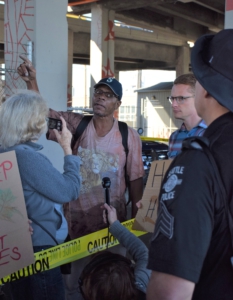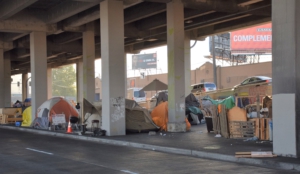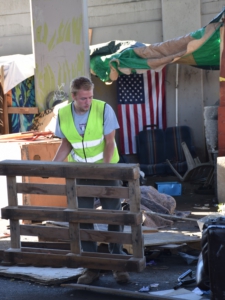Liberation photos by Lee Hessler. Feature image caption: Activists from a range of organizations protest “sweep” of Spokane St. encampment.
On September 12, Seattle Police and representatives from the Finance and Administrative Services began conducting the latest homeless “sweep” in the city of Seattle. The targeted encampment, located at 4th Ave. South & South Spokane Street, had upwards of 60 residents and was currently one of the largest of its kind in Seattle before being given just three weeks’ notice to vacate the contested area before it was demolished.

Members from a wide range of organizations, including the Neighborhood Action Coalition and the Stop the Sweeps Coalition, Transit Riders Union, People’s Congress of Resistance, Socialist Alternative, Women in Black, the Party for Socialism and Liberation and more protested the sweep, referring to the actions undertaken by the police and city for neither adequately providing short-term solutions nor addressing the broader systemic causes of poverty and homelessness in Seattle. As a consequence for refusing to vacate the area, two protesters were arrested by Seattle Police on the grounds of “trespassing” in a city “work zone.”
“We’re standing in solidarity with our neighbors against this inhumane and traumatizing treatment at the hands of the Seattle Police Department and city officials” said Travis, a member of the NAC who protested the sweep. He continued to tell Liberation News: “What is truly needed is housing for all. Everyone knows there isn’t enough affordable housing in Seattle, and people need to know that shelters aren’t the answer.”
Homelessness is a major and re-occurring problem in Seattle; it is estimated that as many as 12,000 people of all ages (including children) across Seattle lack shelter and permanent residency, forcing many onto the streets in tents or in their cars. While homeless shelters are intended to be a temporary solution for people without a home, they are notorious for lacking adequate resources for residents and are widely cited as being ineffective for their stated purpose, including enforcing high barriers for entry which deny homeless persons access to their services.In addition, the number of available shelter beds is less than the number of people living outside.

George Scarola, Seattle’s Director of Homelessness, had a different perspective as he spoke with protesters. “We’ve been sending city workers out here for weeks, speaking and working with the residents and being attentive to them,” he claimed. “But this group is ‘service-resistant’; they don’t want to go to the shelters. And as winter approaches, we’re concerned about cold weather and public health.” Scarola also cited safety concerns; earlier in August, a nearby shooting drew the attention of city authorities, who subsequently chose to demolish the encampments and scatter its residents to uncertain fates. “It’s ridiculous,” noted Travis; “You have shootings all over the city, and yet they aren’t destroying homes and evicting people in those neighborhoods or areas where they happen.”
Residents of the encampment had their own reasons for rejecting the offered shelter beds. Bob, a long-time resident of the camp, pointed out to Liberation that the nature of shelters themselves was one of constant discomfort, lack of privacy and dehumanizing regimentation. “Most of the people here, including myself, have lived in shelters. You try living with 30 other people you don’t know in a space like that for a month. It would drive you crazy. There’s no dignity in it!”

The South Spokane St encampment, before being forcibly demolished, was well-organized and dutifully maintained by its residents, who swept away litter and kept the area clean. Many in the encampment worked various jobs in the area, from fast food to tech. Some had even built wooden structures including fences and walls at the time of the dispersal, indications of hope for a more permanent place to call home. Now, these hopes lay dashed as city workers and police broke apart their homes and piled the debris into waiting garbage trucks.
The immense numbers of homeless persons in Seattle is indicative of a severe shortage of deeply affordable housing in Seattle; a crisis openly acknowledged on a large scale by both struggling residents and city officials. The construction of additional affordable housing would cost the City of Seattle approximately $350,000 per unit, though options as low as $100,000 have been available in the past. Instead, wealthy property owners and urban developers have ensured that virtually all new housing construction is tailored to wealthy potential buyers attracted to Seattle by the powerful tech and service giants that dominate the city, and thereby pricing working-class and low-income families out of the city.
Despite the enormity of such a challenge, Seattle activists are fighting back with the recent establishment of the Housing for All coalition , aimed at quadrupling affordable housing efforts in the city. Until then, connectedness and attentiveness to homeless communities is crucial. “Get to know these communities and help to stabilize them”, Travis recommended. “All police sweeps do is throw them into disarray and instability. But overall, we need affordable, plentiful housing for all.” Speaking with residents of the encampment yielded similar perspectives. “We just want to live with dignity, that’s all,” lamented Bob. “We want a place we can call home, and you can’t get that from a shelter. Someplace we can come home to; that shouldn’t be too much to ask.”

As for the root cause of homelessness in Seattle and elsewhere, Director of Homelessness Scarola had a few closing remarks on the subject. “It’s fallout from the failure of capitalism,” he bluntly admitted. “You can mitigate it some, but not everyone can compete in the market. And the same thing’s happening all over the world.” Such a candid remark is not surprising however for those who acknowledge that providing housing and services for all, as an unprofitable venture, is anathema to capitalism, and cannot be solved without its dissolution. If homelessness is a symptom of the disease of capitalism, then the cure can be none other than socialism.






